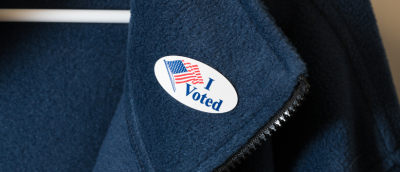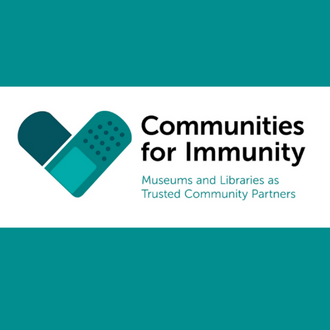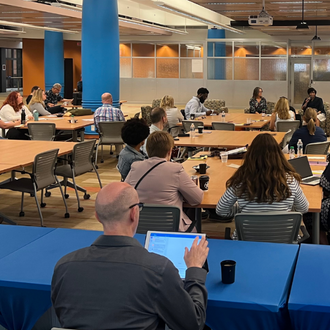The Library, Democracy and You

Authored by Carsyn Fessenden, Communications Intern, Urban Libraries Council
One of the hallmarks of a successful democracy is a robust civil society. Often referred to as the “third sector” after government and business, civil society enables citizens to come together bound by a common interest. It encompasses everything from NGOs to birdwatching clubs and it empowers people to hold their institutions accountable and deliver essential services to their neighbors. The eternal question surrounding civil society and democracy is that of the chicken and the egg. Can a democracy only function with a preexisting civil society, or does a strong democracy provide the correct conditions for a civil society to emerge? While political philosophers continue to debate this, one thing remains abundantly clear: the public library is one of the strongest indicators of a well-built civil society and a flourishing democracy.
The Library as a Democratic Institution
Democracies are built on the ability for citizens to educate themselves and make informed decisions. Public libraries are one of the only places where information is readily available to anyone who might seek it out, and they often exist separately from the ever-changing nature of electoral politics. Through election cycles in a community, the public library and its resources are available for those who wish to use it. That is, as long as elected officials recognize the importance of preserving the public library and its unique position between government and civil society.
A public library may be funded by local or state governments, but it fundamentally exists as a tenet of civil society. It is a communal area where any of its patrons may come and use its resources for free. We are long past the era of libraries just being a house for books; they contain STEM labs, meeting spaces and community kitchens. Beyond the physical buildings taking on a new shape, the content within has also changed. Libraries feature essential resources for budding entrepreneurs, historical archives, Pride collections and information on how to register to vote.
These resources, as well as the ones that will emerge as the role of the public library continues to evolve and grow, are available to every citizen regardless of their economic status. The public library is able to create a distinctive partnership between the government and civil society that is unrepeatable and utterly essential. Yet, the public library seems to be losing footing in our “democratic” institutions.
The Library in Limbo
The public library on an individual level provides free, indispensable resources that aren't available anywhere else. The public library on a societal level is a beacon of information that represents a community’s ability to hold their government accountable. It toes this line because it must — no other institution in civil society is able to achieve what a public library does and preserving its ability to do so is of utmost importance.
There is a growing trend among our elected officials to categorize the public library as a partisan institution. Whether it's defunding libraries at the federal level or banning books that don’t align with a party’s interests, attacking the unrestricted access to information that libraries provide is an essential step in removing an electorate's ability to participate in free and fair elections. Attempts to politicize the public library are fundamentally undermining the ability for our society to function and must be treated as what they really are: attacks on democracy. The public library, civil society and democracy are intrinsically linked and removing one will erode the rest.
Brian Munoz, “Several books which have been challenged by parents based on their content are pictured at Left Bank Books in St. Louis’ Central West End neighborhood last November,” January 28, 2022, St. Louis Public Radio
The Library as a Battleground
So, how do we stop — and, hopefully, reverse — the targeted campaign to wear away at the public library and our democracy?
- Communicate the library’s value. Despite the attempts by elected officials to turn the public library into a political bargaining chip, everyone, regardless of their political party, can benefit from the resources offered at the public library. Making this value known through avenues like ULC’s Business Value Calculator or partnerships to increase library visibility can ensure that people will vote with the public library in mind.
- Fight back. Book bans are an attack on a community’s ability to freely access information which means the most important thing libraries can do is make that information freer than ever. Programs like banned book clubs go directly against the goal of a book ban and highlight the books that politicians don’t want their constituents to see — a vast majority of which involve the LGBTQ+ community or BIPOC.
- Arm your community with the information they need. As “alternative facts” spread, as politics get harder to navigate, as breaking news gets hidden behind paywalls, it is essential that people have the ability to make critical decisions regarding the media they consume and the information they get from it. All-in-one web pages containing crucial facts or programs to promote news literacy will help make sure a community can continue to make informed decisions regarding who they want representing them and what they really stand for.
The Library as the Future
The future of our country and its democratic institutions is looking more and more uncertain by the day. There is no switch to flip to put us back on the correct path; one of open access to information and fully funded public institutions. However, we must not lose hope. The unique position of the library in civil society is one that is entirely dependent on the community’s willingness to support it: it can only serve us as long as we serve it.
Donating if you can, voting if you can’t, and utilizing the myriad resources the public library offers are some of the first steps we can take to lay the groundwork for a long and successful future for the public library, our civil society, and our democracy. As ULC CEO Brooks Rainwater explained in an interview with Library Journal, “really, [democracy] is fundamental to what libraries are. They’re places of knowledge that want to share all of that knowledge, not have it diminished by those who would fear books.”
Related Articles

Boosting Vaccine Confidence Through Communities for Immunity
Urban Libraries Council
Discover how ULC members utilized Communities for Immunity funding to support vaccine confidence at the local level.
Learn More

Library Partnerships in a Post-COVID WorldLibrary Partnerships in a Post-COVID World
Urban Libraries Council
Library leaders from 19 ULC member libraries across North America convened in Cleveland, Ohio to share and discuss how public libraries can continuously enhance their role as valuable partners and leaders within the community.
